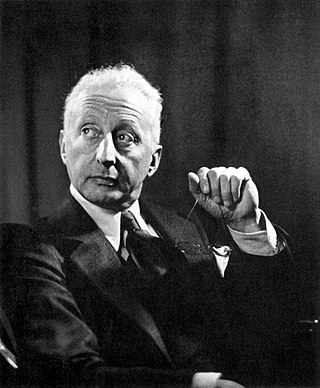
Jerome David Kern was an American composer of musical theatre and popular music. One of the most important American theatre composers of the early 20th century, he wrote more than 700 songs, used in over 100 stage works, including such classics as "Ol' Man River", "Can't Help Lovin' Dat Man", "A Fine Romance", "Smoke Gets in Your Eyes", "The Song Is You", "All the Things You Are", "The Way You Look Tonight" and "Long Ago ". He collaborated with many of the leading librettists and lyricists of his era, including George Grossmith Jr., Guy Bolton, P. G. Wodehouse, Otto Harbach, Oscar Hammerstein II, Dorothy Fields, Johnny Mercer, Ira Gershwin and Yip Harburg.
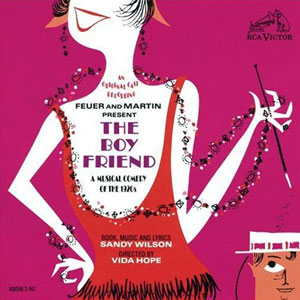
The Boy Friend is a musical by Sandy Wilson. Its original 1954 London production ran for 2,078 performances, briefly making it the third-longest running musical in West End or Broadway history until they were all surpassed by Salad Days. The Boy Friend marked Julie Andrews' American stage debut.

Lionel John Alexander Monckton was an English composer of musical theatre. He became Britain's most popular composer of Edwardian musical comedy in the early years of the 20th century.

Félix Marie Henri Tilkin, better known by his pen name Ivan Caryll, was a Belgian-born composer of operettas and Edwardian musical comedies in the English language, who made his career in London and later New York. He composed some forty musical comedies and operettas.

The Toreador is an Edwardian musical comedy in two acts by James T. Tanner and Harry Nicholls, with lyrics by Adrian Ross and Percy Greenbank and music by Ivan Caryll and Lionel Monckton. It opened at the Gaiety Theatre in London, managed by George Edwardes, on 17 June 1901 and ran for an extremely successful 675 performances. It starred Marie Studholme, Gertie Millar, Harry Grattan, Edmund Payne, George Grossmith, Jr. and the young Sidney Bracy. Gabrielle Ray later joined the cast. The show also enjoyed Broadway runs in 1902 and 1904 and toured internationally.
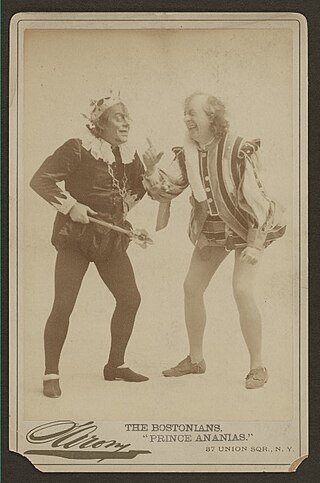
Prince Ananias was the first operetta composed by Victor Herbert. The libretto is by Francis Neilson. It was first produced by a troupe called "The Bostonians" at The Broadway Theatre on November 20, 1894, directed by Jerome Sykes. It remained in their repertoire for three seasons and was given more than 300 performances in all. A modest success at first, it did well on tour.

The Shop Girl was an Edwardian musical comedy in two acts written by Henry J. W. Dam, with lyrics by Dam and Adrian Ross and music by Ivan Caryll, and additional numbers by Lionel Monckton and Ross. It premiered at the Gaiety Theatre in London in 1894 and ran for an extremely successful 546 performances. Its cast included Seymour Hicks, George Grossmith Jr., Arthur Williams, Edmund Payne, and Ellaline Terriss. It soon played in New York and was successfully revived in London in 1920.
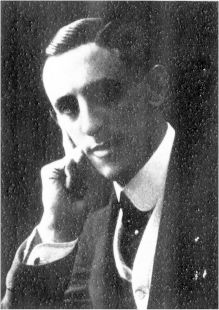
Paul Alfred Rubens was an English songwriter and librettist who wrote some of the most popular Edwardian musical comedies of the early twentieth century. He contributed to the success of dozens of musicals.
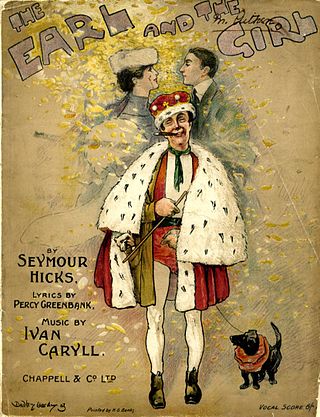
The Earl and the Girl is a musical comedy in two acts, with a book by Seymour Hicks, lyrics by Percy Greenbank and music by Ivan Caryll. It was produced by William Greet and opened at the Adelphi Theatre in London on 10 December 1903. It transferred to the Lyric Theatre on 12 September 1904, running for a total of 371 performances. It also ran at the Casino Theatre in New York beginning on 4 November 1905 for 148 performances, starring Eddie Foy and W. H. Denny. A production toured Australia in 1906 and 1907. A revival in London in 1914 ran for a total of 107 performances, and there were later revivals and tours.
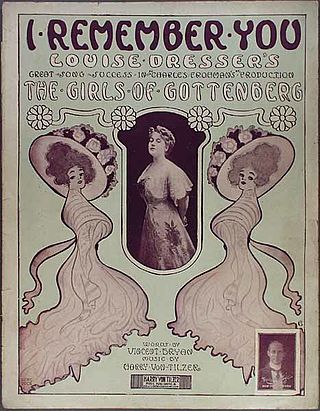
The Girls of Gottenberg is an Edwardian musical comedy in two acts by George Grossmith, Jr. and L. E. Berman, with lyrics by Adrian Ross and Basil Hood, and music by Ivan Caryll and Lionel Monckton. P. G. Wodehouse's personal papers indicate that he wrote the lyrics for one song, "Our Little Way", but this was not included in the libretto of show, and he was not credited as a lyricist. Set in Germany, the comedy of the show is largely based on stereotypes of the German people and their culture as seen seen through a British lens.

An Artist's Model is a two-act musical by Owen Hall, with lyrics by Harry Greenbank and music by Sidney Jones, with additional songs by Joseph and Mary Watson, Paul Lincke, Frederick Ross, Henry Hamilton and Leopold Wenzel. It opened at Daly's Theatre in London, produced by George Edwardes and directed by James T. Tanner, on 2 February 1895, transferring to the Lyric Theatre on 28 May 1895, and ran for a total of 392 performances. The piece starred Marie Tempest in the title role, Hayden Coffin, Letty Lind, Leonora Braham, Eric Lewis, Maurice Farkoa, Marie Studholme, and Louie Pounds. It also had a Broadway run at the former Broadway Theatre from 21 December 1895 through 8 February 1896.

The Girl Behind the Counter is an Edwardian musical comedy with a book by Arthur Anderson and Leedham Bantock, music by Howard Talbot and lyrics by Arthur Anderson.

George Grossmith Jr. was an English actor, theatre producer and manager, director, playwright and songwriter, best remembered for his work in and with Edwardian musical comedies. Grossmith was also an important innovator in bringing "cabaret" and "revues" to the London stage. Born in London, he took his first role on the musical stage at the age of 18 in Haste to the Wedding (1892), a West End collaboration between his famous songwriter and actor father and W. S. Gilbert.

Monsieur Beaucaire is a romantic opera in three acts, composed by André Messager. The libretto, based on the 1900 novel by Booth Tarkington, is by Frederick Lonsdale, with lyrics by Adrian Ross. The piece premiered at the Prince of Wales Theatre in Birmingham, England, on 7 April 1919, before opening at the Prince's Theatre in London under the management of Frank Curzon on 19 April 1919 and transferring to the Palace Theatre on 29 July 1919, for a successful run.
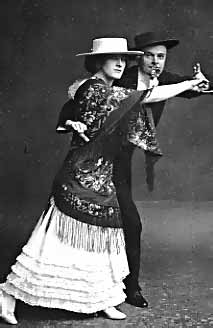
The Sunshine Girl is an Edwardian musical comedy in two acts with a book by Paul A. Rubens and Cecil Raleigh, lyrics and music by Rubens and additional lyrics by Arthur Wimperis. The story involves a working girl who falls in love with the heir to the factory. He is in disguise and wants to be loved for himself, not his position, so he gets his friend to pose as the heir, leading to complications for both men.

Ruth Donnelly was an American film and stage actress.

Caroline Maria Lupton, known professionally as Marie Studholme, was an English actress and singer of the Victorian and Edwardian eras, known for her supporting and sometimes starring roles in Edwardian musical comedy. Her attractive features made her one of the most popular postcard beauties of her day.

The Duchess of Dantzic is a comic opera in three acts, set in Paris, with music by Ivan Caryll and a book and lyrics by Henry Hamilton, based on the play Madame Sans-Gêne by Victorien Sardou and Émile Moreau. Additional lyrics by Adrian Ross. The story concerns Napoleon I and a laundress, Catherine Üpscher, who marries Marshal Lefebvre and becomes a Duchess.

Kissing Time, and an earlier version titled The Girl Behind the Gun, are musical comedies with music by Ivan Caryll, book and lyrics by Guy Bolton and P. G. Wodehouse, and additional lyrics by Clifford Grey. The story is based on the 1910 play, Madame et son Filleul by Maurice Hennequin, Pierre Véber and Henry de Gorsse. The story is set in contemporary France, with a glamorous actress at the centre of a farcical plot of imposture, intrigue and mistaken identity.






















